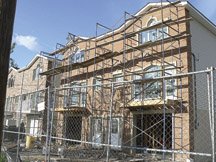The town is using a unique funding mechanism to help low and moderate income homeowners fix up old properties in need of upgrades and renovations.
Drawing resources from the Hudson County Community Development Block Grant program and money from the Secaucus Affordable Housing Board, the program will enable strapped homeowners to refurbish their properties, and the town will get some credit for meeting a portion of its state-mandated affordable housing obligation.
“The mayor wanted to find a way to parlay the available funds the county has for this sort of thing along with some of the money our Affordable Housing Board Director [William Snyder] has,” explained Town Administrator David Drumeler. “Bill has done a program like this before, but on a much smaller scale that involved a smaller pool of money. By pulling these two programs together, we have a larger pot of money and can offer larger grants to homeowners.”
Homeowners must be income eligible to qualify for the program.
________
Under the current phase of the program there’s a combined total of about $195,000 available for home renovations.
Eligible homeowners can receive grants of up to $15,000, although smaller grants will be awarded as well. For homes that receive the maximum grant amount, $10,000 will come from the affordable housing trust fund, and $5,000 will come from the county.
Money from the Community Development Program is a grant that homeowners don’t have to repay. The money from the town is, however, a loan, although the loan is forgiven if the homeowner remains in the property for at least 10 years. Property owners who leave their homes before 10 years would be required to repay a pro-rated portion of the loan.
Money paid into the trust fund comes from fees charged to developers building projects in town.
The town estimates that at least 13 housing units will be rehabilitated under this next phase of the program.
Must be income eligible
Homeowners must be income eligible to qualify for the program, which is why Secaucus can count the rehabbed units towards its affordable housing obligation.
Single individuals must have an income that doesn’t exceed $45,835. A two-person household can’t exceed an income of $52,382. A three-person home cannot exceed $58,930. The income limit for a family of four is $65,478, while the maximum income for a household of five is $70,716.
Although some affordable housing advocates have been critical of the town’s previous attempts to meet its affordable housing obligation, Kevin Walsh, staff attorney with the Fair Share Housing Coalition, applauded the rehabilitation program last week.
“Towns actually have two [affordable housing numbers],” said Walsh, who has often found fault with Secaucus’ efforts to meet its state required affordable housing obligation. “The one that we normally focus on has to do with the projected affordable housing needs in the region…But there’s a second number that doesn’t get discussed as much, and that’s a town’s present need for affordable housing, and rehabilitation work falls under this second obligation. Meeting present need affordable housing obligations are rarely controversial, since towns like to help their own people. So that’s why you tend not to hear about rehabilitation projects like this one. But this is a good thing. This is what maintaining good housing stock is all about.”
The rehabilitations will be done by contractors approved by Snyder, who, Drumeler said, is in the process of putting together a Request for Quotes for interested developers.
Although there is an application that must be filled out to be considered for the program, Drumeler said there is no deadline and applications will be reviewed and approved until money for the program has been exhausted.
Beth Siskin, a resident of Lyndhurst who was raised in Secaucus and who still has family who lives in town said, “I’ve never heard about this program, but I’m going to tell my mother about it. Her house could use a lot of work. She’s on a fixed income now, so she probably won’t fix any of the stuff that needs fixing unless she gets some help like this.”
For more information about the program, call (201) 867-5902.
E-mail E. Assata Wright at awright@hudsonreporter.com.
